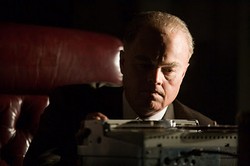J Edgar Eastwood
|
| updated |
Copy Link Code
|
 When it comes to J. Edgar Hoover, Clint Eastwood has joined several other directors who have made the gargantuan effort to memorialize such a controversial historical character in film. In the 2011 film J. Edgar, Eastwood captured the controversy, drudgery, and excitement which seemed to follow J. Edgar Hoover throughout his entire career. As director of the movie J. Edgar, Clint Eastwood knew the undertaking would not be easy. With Hoover's controversial career and rumors about the man's personal life still swirling decades after his death, Eastwood knew there would be a great deal of controversy about his film, but he chose to move forward, anyway.
When it comes to J. Edgar Hoover, Clint Eastwood has joined several other directors who have made the gargantuan effort to memorialize such a controversial historical character in film. In the 2011 film J. Edgar, Eastwood captured the controversy, drudgery, and excitement which seemed to follow J. Edgar Hoover throughout his entire career. As director of the movie J. Edgar, Clint Eastwood knew the undertaking would not be easy. With Hoover's controversial career and rumors about the man's personal life still swirling decades after his death, Eastwood knew there would be a great deal of controversy about his film, but he chose to move forward, anyway.
In depicting Hoover, Clint chose to focus on his career from the Palmer Raids (in 1919-20) through his death in 1972. However, in an attempt to remain historically accurate regarding the personal life of J. Edgar Hoover, Eastwood decided to also examine his purportedly 'confused' sexuality. The movie stars Leonardo DiCaprio as the former director of the FBI, who easily flits between young and old Hoover, with convincing performances on both sides of the coin.
As a director of the movie about Hoover, Eastwood knew he would face his own form of controversy, for his choice to portray Hoover as a probably-closeted homosexual, who spent most of his career denouncing those who led a homosexual lifestyle. Although the film is very entertaining, it also takes certain artistic licenses regarding what could or might have happened during certain events throughout Hoover's career and lifetime. There are brilliant moments, such as Hoover explaining his idea to fingerprint every citizen for easier identification of criminals. The film is instrumental in its portrayal of Hoover as a deeply disturbed man, guilty of numerous, confusing obsessions over specific people. While some make perfect sense (his propensity to focus on homosexuals is a classic attempt to punish himself), others are not so clear (his determination to prove Martin Luther King, Jr. is a philanderer). It showcases his efforts to curtail the explosion of American gangsters, which is eventually successful, and gives intimate glimpses into his life with Clyde Tolson (his purported lover of several decades). Eastwood also displays how inept Hoover was around women; behavior compiled from interviews with hundreds of Hoover friends, and numerous biographies written about him.
In the film, Hoover's character (portrayed by Leonardo DiCaprio) shows an immense propensity to flip-flop back and forth between decisiveness and authority, to outright indecision and fear. At times, characters and scenes feel contrived, but the majority have a genuine touch of authenticity, especially when DiCaprio acts uncomfortable, confused, jealous, and petty. From historical documents and interviews with those close to Hoover, including eight presidents and countless hundreds of those in the highest levels of power in the U.S., it is safe to assume those behaviors are accurate. Although he was somewhat successful, overall, the impression Hoover leaves on history is precisely the overall idea presented by the film: contradiction, denial, obsession, and barely-contained rage.
